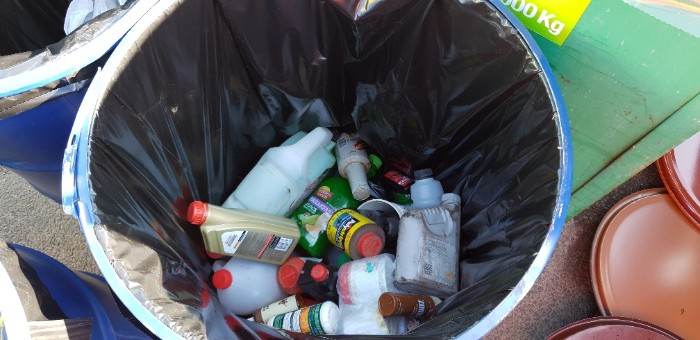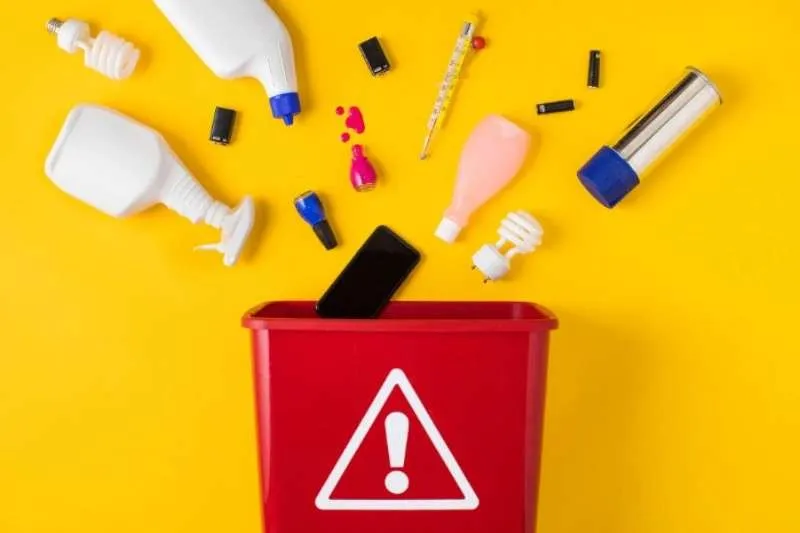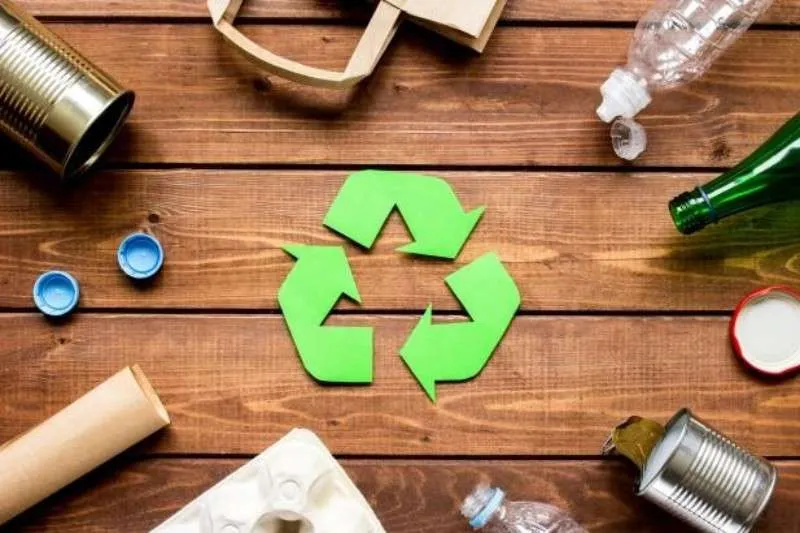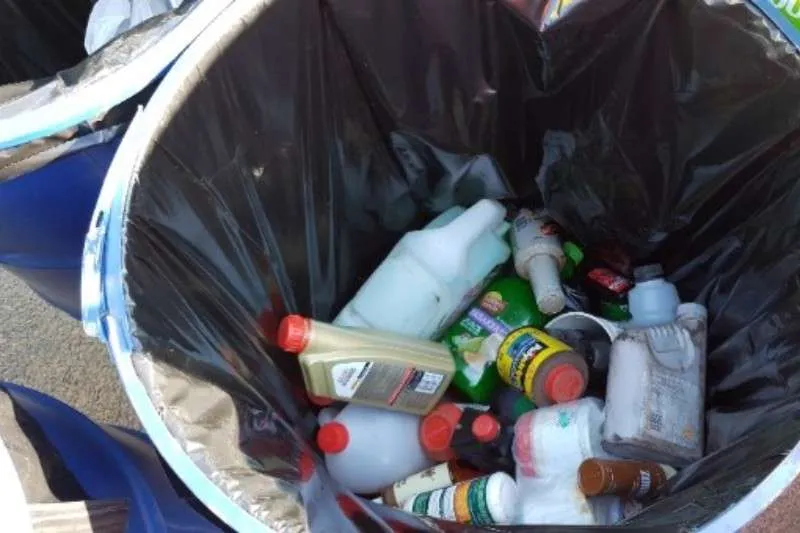
Do you ever look around your home and wonder what to do with all the half-empty paint containers, motor oil filters, cleaning supplies, fertilizers, and pesticides?
You may not think twice about simply using plastic bottles and throwing them away in the trash – but that same way could be hazardous to both yourself and our environment! Disposing of household chemicals properly is essential for keeping your family, pets, and community safe.
In this blog post, we’ll explore how to safely dispose of common household items containing dangerous chemicals in an eco-friendly manner. Read on to learn more.
Introduction to household chemical disposal
Household chemicals and wastes are common in many homes and dangerous if improperly disposed of. Improper disposal of these products can lead to soil, water, and air contamination and harm human health. This article will discuss how to properly dispose of household chemicals, the dangers associated with improper disposal of incompatible products, and the impact these chemicals and wastes can have on septic systems and the environment.
The dangers of improper chemical disposal
When properly disposing of household chemicals, many people do not understand the potential dangers of improper disposal. Improper disposal of garden chemicals can seriously impact local septic and wastewater treatment systems and the environment.
Chemicals that are flushed down toilets or drains can cause severe damage to a home’s septic system. These chemicals can accumulate in the septic tank and then flow into the environment, contaminating groundwater and local water supplies. In addition to other chemicals, some household products may contain corrosive agents that can corrode pipe walls, leading to leaks and possible pollution of nearby waterways running water through.
It is also important to consider the local environment and environmental health and how improper disposal of household chemicals affects the environment. These chemicals can make their way into local waterways, polluting the water and causing health risks for humans and animals. In addition, some chemicals may be toxic to plants and other organisms.
As a result, it is essential to properly dispose of household chemicals so they do not end up in the wrong places. Many communities have hazardous waste collection centers where individuals can bring these materials for safe disposal. Alternatively, some chemicals may need to be taken to a local recycling center if product containers are not accepted at the local household hazardous waste or collection facility.
When disposing of household chemicals, it is important to always read and follow the instructions on cleaning product containers and labels and take extra care when dealing with food containers or potentially corrosive materials. Doing so will help protect local septic systems and the environment at large.
Identifying hazardous household chemicals

It is important to know how to properly dispose of household chemicals. Many everyday products contain hazardous chemicals, which can be dangerous if improperly handled and disposed of correctly. To ensure that your home is safe, it is necessary to identify the hazardous chemicals you may have in your possession and learn how to handle them safely.
Common household items that contain hazardous chemicals include paints, oils, cleaning supplies, and aerosols. These substances release volatile organic compounds (VOCs) into the air when used or stored improperly, resulting in indoor air pollution. Many of these items are corrosive or flammable and can be hazardous if handled incorrectly.
To safely handle most household cleaning products and chemicals, it is important to read labels and understand their risks. The label will provide information about the product’s proper use, storage, and potential hazards. For example, some cleaning products may require ventilation in enclosed spaces or advise against mixing certain chemicals.
It is also important to know how to properly dispose of hazardous chemicals. The best way is to take them to a designated chemical collection center specializing in disposing of safe management of such materials. This ensures that the chemicals are not released into the environment and keeps them away from children and pets.
Local hazardous waste collection programs
Local hazardous waste collection programs are an important resource for disposing of household chemicals safely. Many local governments and organizations worldwide offer regular collection services, either in-person or online. Contact your local government or search online to determine if your local level or area has a hazardous waste collection program.
Finding and utilizing hazardous waste collection facilities in your area is the best option for disposing of household chemicals. Many areas have permanent collection sites where you can take your household hazardous waste materials for proper disposal. Contact your local government or search online to find out if there are any permanent household hazardous waste collection sites in your area.
Participating in community hazardous waste collection events is another great way to dispose of household chemicals. Many cities, counties, and organizations offer community-wide collection days when citizens can bring their household hazardous waste and materials to a central location for proper disposal. Contact your local government or search online to find out if there are any upcoming events in your area.
By following these steps and participating in local hazardous waste collection programs, you can properly dispose of household chemicals and help keep your community safe. Take the time to research disposal options in your area, and participate when these events come around!
Safe disposal of specific household chemicals
Household chemicals can be hazardous if not disposed of properly. To help ensure your safety and the safety of your local environment, we have outlined some key guidelines for disposing of small quantities of commonly used household chemicals.
- Paint and Solvents: Paint and related solvents should always be disposed of and controlled to avoid potential environmental damage. If possible, reuse or donate leftover paint or solvents to local organizations that accept these materials. When this isn’t possible, contact your local municipality or a hazardous waste center to find where you can take the materials for proper disposal.
- Automotive Fluids: Automotive fluids such as motor oil, antifreeze, and brake fluid should never be poured down the drain or into local bodies of water. Instead, contact your municipality to find out where to take these fluids for proper disposal at a hazardous waste center.
- Cleaning Products: Cleaning products such as sprays, detergents, and bleaches should be properly stored in original containers and kept away from children and pets. Make sure to read the product labels for any disposal instructions. Contact your local municipality or a hazardous waste center to determine proper disposal methods if unsure.
- Pesticides: Pesticides are potentially toxic when not disposed of correctly. Always follow the instructions on product labels for proper disposal and contact your municipality or hazardous waste center if further assistance is needed.
- Batteries: Batteries should never be disposed of in regular trash bins as they contain potentially corrosive or explosive materials that can be hazardous to the environment. Many local stores have recycling bins for used and rechargeable batteries, which should be taken there.
Following these guidelines, you can ensure that household chemicals are disposed of safely and properly to protect the environment and your family’s health. It is important to remember that all hazardous materials must be stored in original containers, kept away from children and pets, and only disposed of when necessary. If you have any questions about proper chemical disposal, contact your local municipality or hazardous waste center for further assistance.
Recycling and reusing household chemicals
When properly disposing of household chemicals, it’s important to consider recycling and reusing them. Recycling can help decrease the waste sent to landfills while reusing unused products can help reduce the production of new products and materials.
Tips for recycling used motor oil, antifreeze, and other automotive fluids
Here are some tips for recycling used motor oil, antifreeze, and other automotive fluids:
- Check with your local auto parts store to see if they take used oil or will dispose of it for you.
- Look up recycling centers in your area that accept used motor oil and other automotive fluids.
- Contact your local hazardous waste disposal facility to determine their regulations and requirements.
You can also get creative with reusing or repurposing household chemicals. For example, used motor oil can be reused as a lubricant for machinery and added to compost piles to help break down organic matter more quickly. Paint thinner may be used to clean paintbrushes and other surfaces. And vinegar can be used as a cleaning and deodorizing agent around the home.
It’s important to follow proper disposal procedures for household chemicals, such as recycling or repurposing waste products where possible. This helps to reduce waste and promote in our homes and communities.
Reducing your household chemical footprint

Taking the time to properly dispose of household chemicals safely is an important part of keeping our environment clean and healthy. By reducing your household chemical footprint, you can help reduce the amount of hazardous waste produced yearly.
When shopping for products, consider choosing eco-friendly, septic-safe alternatives that are less toxic and help keep hazardous substances out of our water supply. Many household cleaning products are now available in concentrated form, which means you purchase less packaging and get more productive while reducing waste going into landfills.
There are also some simple tips for using special handling and storing household chemicals responsibly. Always read labels before use and follow safety instructions carefully to reduce the risk of exposure to toxic substances. When storing household chemicals, ensure they are kept in a cool, dry, and well-ventilated area away from children and pets.
Finally, properly dispose of any hazardous wastes or unused or unwanted items. You can check with your local municipality for proper disposal guidelines, as each community has different regulations for dealing with hazardous waste. You can also contact your local recycling center, local waste disposal facility, or hazardous waste management facility for proper disposal techniques.
FAQs
Why is it important to properly dispose of household chemicals?
Properly disposing of household chemicals is important to protect the environment and your family’s health. Many hazardous chemicals can cause serious injury or illness if ingested, inhaled, or exposed to the skin. Properly disposing of these items helps reduce the risk of contamination and keep hazardous substances from entering our water supply.
How can I identify hazardous household chemicals?
Look for labels on products, containers, and packaging indicating the chemical is hazardous or cautionary. Common symbols include a skull-and-crossbones, a flame, an exclamation point, and the word “danger” warning.” You can also use the EPA website to find information about specific chemicals.
What are improper chemical disposal’s environmental and septic system impacts?
Improperly disposing of hazardous chemicals can seriously impact the environment and septic systems. Toxic substances can enter our water supply, contaminating drinking water and causing long-term health problems.
##Can I dispose of household chemicals in my regular trash or recycling?
You should not put hazardous waste or chemicals in your regular trash or recycling. Contact your local municipality for guidelines on properly disposing of household chemicals. Your local hazardous waste disposal facility can also provide information on proper disposal techniques for household waste.
How can I find a hazardous waste collection facility near me?
You can contact your local municipality, hazardous waste management, or waste disposal facility to determine if they offer hazardous waste collection services. You can also check the Earth911 website for a list of local environmental facilities and disposal instructions in your area.
Conclusion
Taking a proactive approach to safely disposing of household items containing dangerous chemicals is the best way to ensure your home and the environment remain healthy and safe. Knowing the basics of how to dispose of all hazardous items correctly, and helping to educate others who may not be aware, makes all the difference. Remember, it doesn’t take much effort; anyone can do their bit for the environment. When in doubt, there are hotlines and websites where you can check how to dispose of each item before throwing it into your trash or recycling bin.


